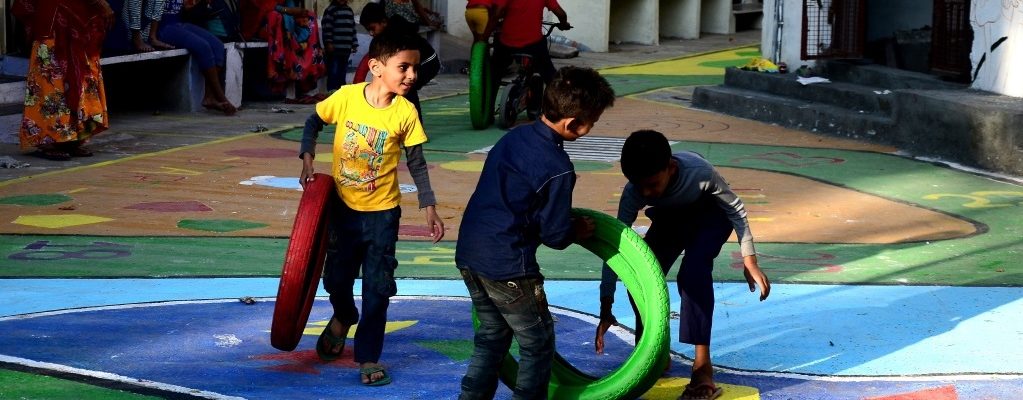How Child-Centred Urban Design and Management is Good for everyone’s Wellbeing

City-dwellers in India have suffered from the Covid-19 as they deal with other multiple shocks and stresses. This takes a toll on families’ resilience – not least, that of young children. Avantika Arjuna of ICLEI South Asia describes how the lives of young children in cities have changed in the past year – and what could change for the better.
The sudden onset of Covid-19 in India, since early 2020, affected the lives of people from all age groups across the country. To curtail the spread of the pandemic, the government had to impose a strict lockdown.
India is home to the world’s second-largest population, including a considerable child population: 36.5 million young children (below 6 years, Source Census: 2011). The lockdown left children with no option but to stay indoors continuously for several months. The government’s efforts to provide for citizens’ basic needs have been praiseworthy, but at the same time, everyone noticed the impact of the restrictions on young children and their minds.
Discussions with parents and caregivers have indicated that the initial days of the lockdown gave children ample time to spend with their families. However, limited exposure to open areas curtailed children’s outdoor activities and affected their physical wellbeing. The social interaction of children within their peer group stopped, resulting in more exposure to electronic gadgets, which also affected their confidence, emotional and mental growth.
The educational system has been hampered due to the pandemic: virtual classes are a completely new arrangement for the children to adopt. Furthermore, the lack of access to electronic gadgets among children in poor communities has led to increased numbers dropping out of school.
As a result of its climate, the city of Udaipur has been planned with many water bodies and city gardens. These are often visited by young children, as there are very few open spaces within neighborhoods for young children.
According to the last census (2011), Udaipur city has about 47,932 children in the 0-6 year age group. Infrastructure facilities such as Anganwaadis (child care centres), primary health centres and playschools are present in the city, but the condition of all such facilities needs to be assessed in order to improve them and use them optimally.
Developing better information and support services for children’s and families’ resilience
Having learned from the pandemic and its effects on young children, Udaipur is in the process of preparing to tackle similar situations in the future – using its available financial resources and physical spaces.
In the coming months, Udaipur plans to adopt data-driven approaches: the city will compile data on infrastructure facilities and services specific to young children such as parks, open spaces, health centres, schools, play schools etc. This information will be used as the basis for providing and upgrading infrastructure for young children.
The city has also been very proactive during the past months in creating awareness related to Covid-19 in the places used by young children such as community parks and gardens. This has helped in building confidence amongst the caregivers and parents of the young children to start using the facilities again – although with utmost precautions.
Allocating specific budget annually to support infrastructure development specific to young children such as planting native trees, developing shaded areas in gardens, primary health centres etc. is also being considered by the city.
To addition to the above and in order to support the city governments, the national government in collaboration with various funding agencies has also developed guidelines for child-friendly cities; specifically, indicators for developing and measuring child-friendly neighbourhoods.
Nurturing neighbourhoods
Cities such as Udaipur, Pune and Bhubneshwar have adopted the concept of Urban95 and have been investing and developing their cities for children under age 6 and their caregivers. Principles of urban design that are baby and toddler-centred and support their development are defined as: protection, basic needs, comfort, interaction and connection (as described in this Udaipur urban design guide). These principles place a high priority on walkability / appropriate pedestrianisation of urban areas, traffic calming measures, and enhancing people’s access to nature and rich sensory experiences. Urban95 principles support a healthy, vibrant urban environment with plenty of trees and green spaces, which enhances climate change mitigation, people’s resilience to the climate, and whole-of-society wellbeing.
Focusing more on the child-friendly neighbourhoods, the government is also encouraging the cities to develop safe, accessible and walkable streets for young children and their families under the ‘Nurturing Neighbourhoods’ challenge. This national challenge aims to “ to improve public space, mobility, neighborhood planning, access to early childhood services and amenities, and data management across city agencies. “
With the new concepts and ideas proposed by the government at national level, it will be worthwhile for the cities to learn from their peer cities and themselves initiate steps on the ground for the benefit of the young children.



